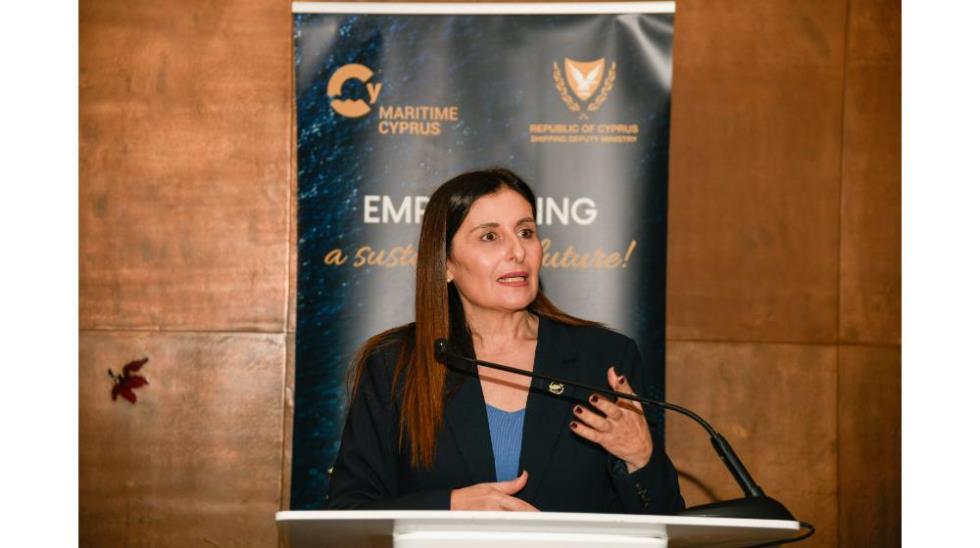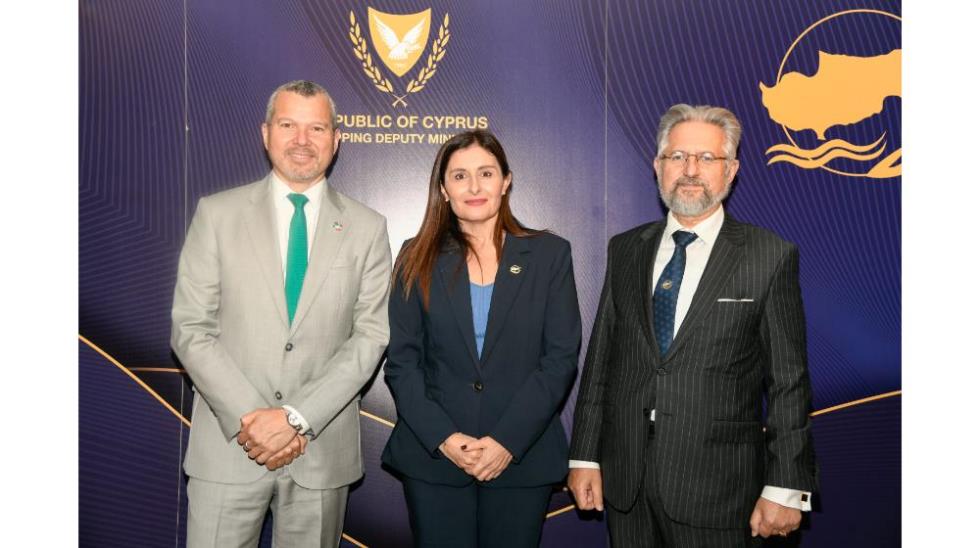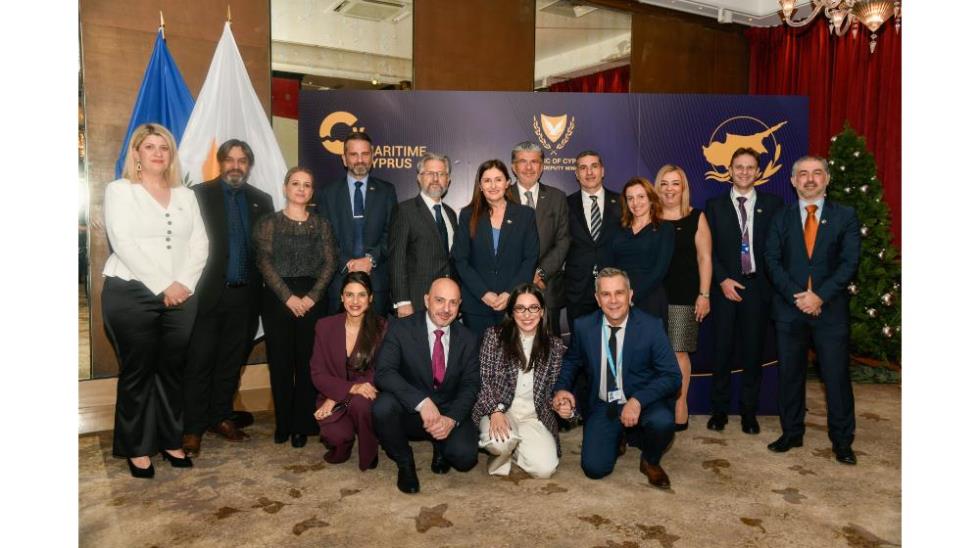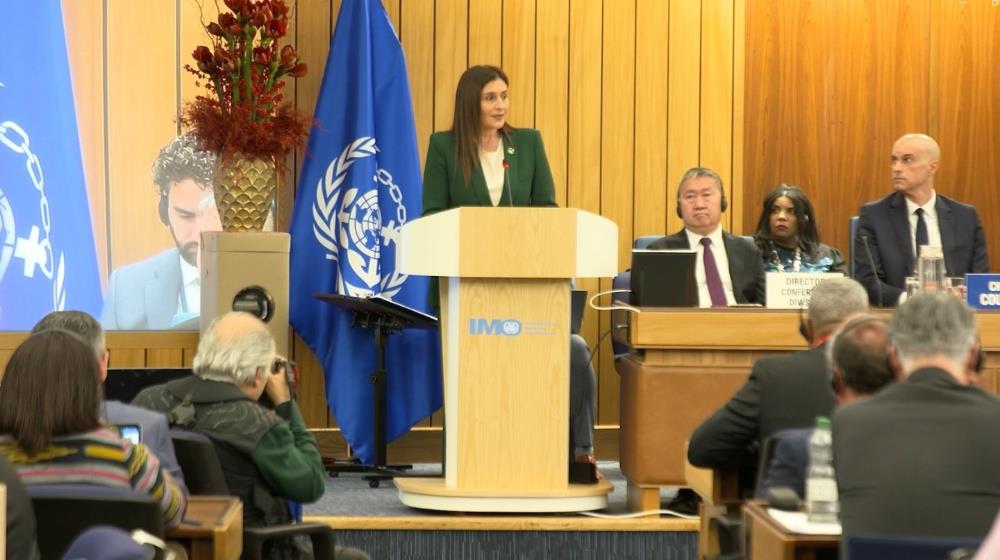The Shipping Deputy Minister of the Republic of Cyprus Marina Hadjimanolis has reaffirmed Cyprus’ longstanding commitment to actively contributing to the IMO’s mission while addressing the Plenary of the 34th General Assembly of the International Maritime Organization (IMO) in London, representing Cyprus.
In her speech, which was made on 25 November, she reaffirmed Cyprus’ longstanding commitment to contribute with all the members of the Organisation as well as to the collective efforts that shape the future of international shipping.

As noted in an official announcement from the Shipping Deputy Ministry, Hadjimanolis highlighted the importance of cooperation, resilience and continued progress within the global maritime community, especially at a time of evolving challenges and opportunities for the sector. She emphasised that shared responsibility and coordinated action are essential for safeguarding the sustainability, safety and competitiveness of both international maritime sector and the oceans.
Later in the evening, the Shipping Deputy Ministry of Cyprus hosted a reception for the delegations of the countries participating in the Assembly.

In her address, Hadjimanolis expressed her appreciation to all attendees, and also highlighted, “Cyprus has consistently played a positive and constructive role in supporting the Organization’s goals—enhancing safety, protecting the marine environment, and improving the working conditions of seafarers. We place great value on the IMO’s leadership as the principal body responsible for regulating international shipping, and we remain fully committed to supporting its work and objectives.”


Read her full speech at 34th General Assembly of IMO, below.
“President,
Distinguished Delegates,
Secretary-General, Dear Colleagues,
It is both my honour and privilege to address the 34th Session of the International Maritime Organization’s Assembly.
The IMO stands as the cornerstone of global maritime governance.
The challenges we face — climate change, security threats, technological evolution — demand not only decisive action but institutional resilience as well.
By strengthening its regulatory frameworks, enhancing technical cooperation, and embracing innovation, IMO will adapt to emerging realities, ensuring that the Organization remains agile, credible, and capable of safeguarding both the maritime sector and the oceans for generations to come.
At the heart of our industry are our seafarers — our greatest asset and our shared responsibility. Our seafarers, who we, so rightly, called “key personnel” during the recent COVID era, are often unseen and unsung.
However, they form the backbone of our global trade. We must eliminate unfair prosecution and abandonment, we must safeguard their welfare through training, we must ensure fair treatment and protect them, under a culture of inclusion, equity and diversity at every level. For that, I would like to congratulate, the Secretary General of the IMO for his leadership and guidance on this issue.
Cyprus, will continue to work tirelessly within the relevant bodies of the IMO toward a comprehensive review of the STCW Convention and Code, to ensure that our training standards meet the needs of a transforming industry.
One of the main foundational principles of IMO is “no more favourable treatment”.
Vessels evading inspections, insurance requirements or compliance with international conventions, undermine our IMO standards. We need to enhance and strengthen technical cooperation and port state enforcement and eliminate any legal loopholes so that the so called “dark fleet” vessels, cannot operate anywhere on the planet.
Piracy threatens both our seafarers and global trade.
We need to expand our network of regional offices and offer additional support, to the regional office in Alexandria, which is strategically located to offer technical support in the region. Strengthened intelligence-sharing, coordination, and swift prosecution will help secure maritime routes, safeguarding the lifelines of commerce and upholding international law.
On climate, international shipping contributes nearly 3% of global GHG emissions. The MEPC’s October session showed how complex consensus can be, but the next 12 months are critical. We must seize this opportunity to finalize a pragmatic legal framework for maritime decarbonization, that reflects both ambition and equity and works for all. After all, one of the main objectives of this effort is to adopt global rules, thereby creating an international level playing field.
IMO's World Maritime Day theme, “Our Oceans, Our Obligation, Our Opportunity”, reminds us of our duty.
Our oceans are our home. I would like to congratulate, the Government of the United Arab Emirates, for the parallel celebration in Dubai, underlining the importance and the essence of our theme this year.
The needs of vulnerable states — SIDS and LDCs — must be one of our priorities. These nations contribute least to climate change, but suffer the most. A fair legal structure should aim to amplify their voices and strengthen their capacities.
The BBNJ Agreement marks a historic step in global ocean governance, aiming to protect marine biodiversity in areas beyond national jurisdiction — covering nearly two-thirds of the world's oceans.
It establishes the world’s first comprehensive framework, for conserving marine life in areas beyond national jurisdiction under UNCLOS. BBNJ will soon enter into force, underlining our commitment to healthy oceans and reinforcing IMO's role within an evolving architecture of high-seas governance.
All of these issues, cannot succeed without capacity building. We need to increase funding for technical cooperation while further enhancing the efficient management and governance of the IMO.
At this moment, I would like to extend heartfelt thanks to the Secretary-General of the IMO for the remarkable administrative reforms and visionary leadership that have revitalized the functioning of the Secretariat. The emphasis on multilingualism and inclusiveness, has made the Organization more accessible and representative of its diverse membership, while the enhancements to GISIS have significantly improved transparency and data-driven decision-making.
Cyprus envisions an IMO that is strong, fair, inclusive, forward-looking and financially healthy. This is what we will jointly work to achieve with all the members of the Organisation. For that, we are determined, we are united, and we are resolute.
Before closing allow me to thank you in advance for your vote at the coming elections for the IMO Council.
Also, it will be my pleasure to host you all at our reception this evening.
Thank you for your attention.”









